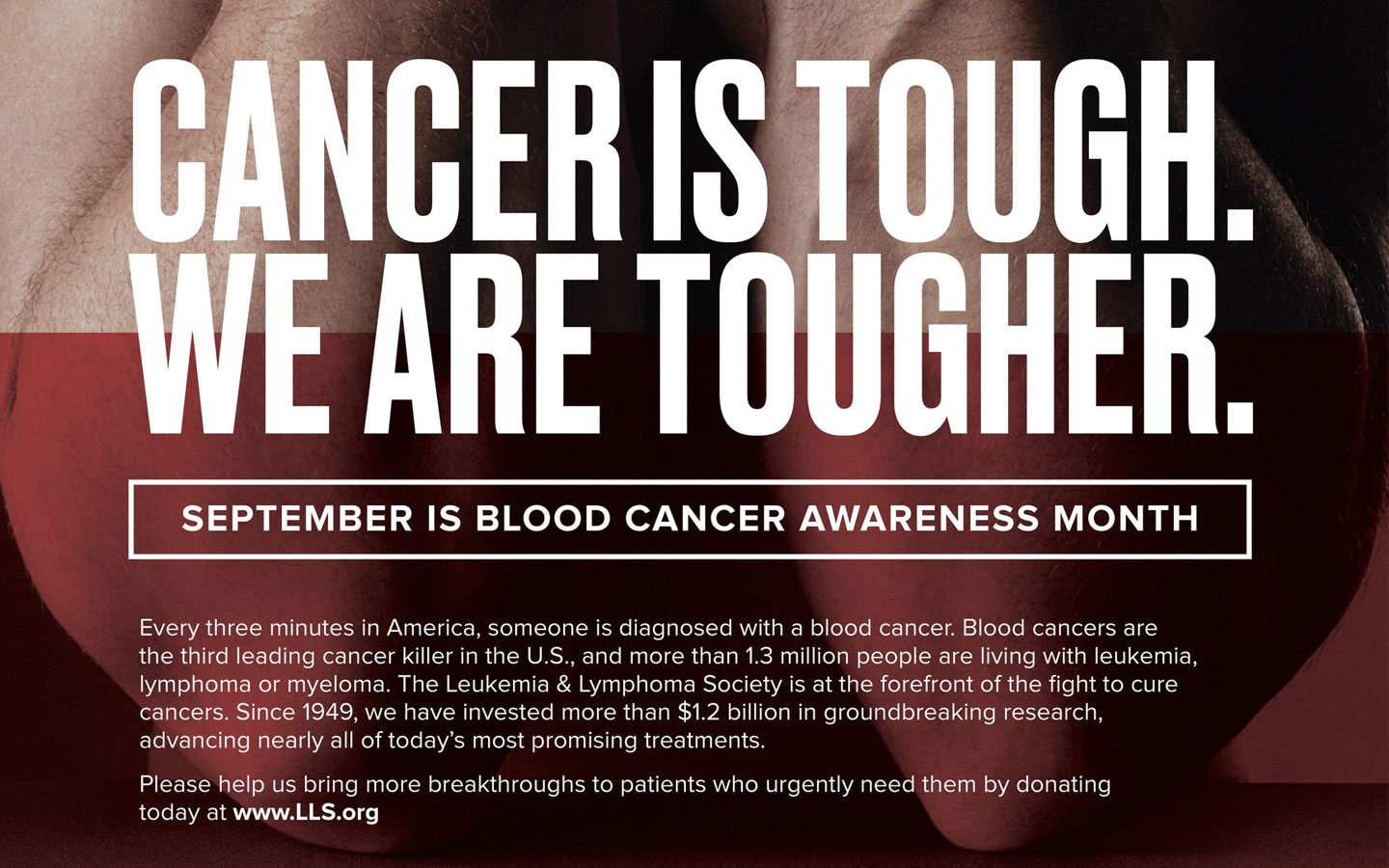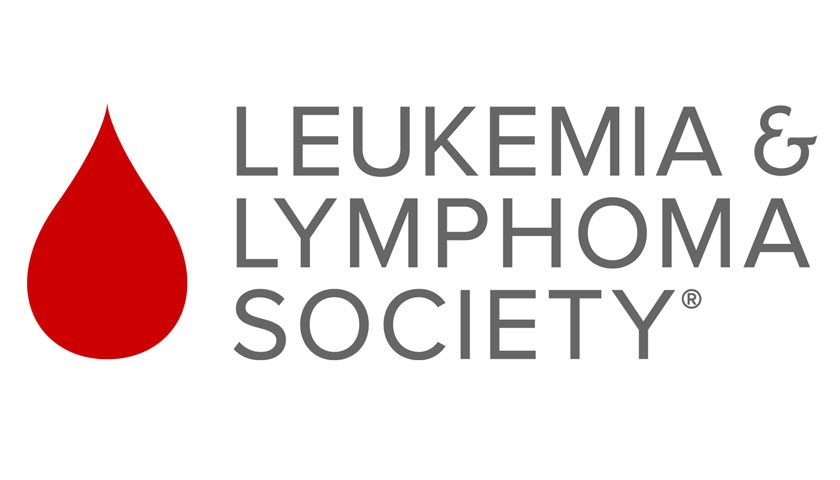Contributing to nearly every advance in blood cancer research and treatment in decades, The Leukemia & Lymphoma Society (LLS) has invested more than $1.2 billion in cancer research, with groundbreaking results in immunotherapy, genomics and personalized medicine that are improving and saving lives of patients. These revolutionary new treatments are powering LLS’s efforts to attack cancer from every angle.
Blood Cancer Awareness Month – every September – provides the opportunity for LLS, the world’s largest nonprofit dedicated to fighting blood cancer, to educate and engage the public about the blood cancers – leukemia, lymphoma and myeloma – which are the third leading cause of cancer deaths among Americans. LLS is at the forefront of the fight to cure cancer, dedicated to finding cures for the nearly 1.3 million people in the U.S. who are living with, or are in remission from, leukemia, lymphoma or myeloma and other blood cancers.
“Cancer is not a one-size-fits-all disease. We prioritize research based on unmet medical needs, and are ushering in a new era of cancer therapy that centers on giving the right treatment to the right patient at the right time,” said Louis J. DeGennaro, Ph.D., LLS president and CEO. “Further, we are seeing our vision for and approaches to treating the blood cancers now helping patients with other cancers, which is why we are proud to say that beating cancer is in our blood.”
Leukemia, Lymphoma and Myeloma – Latest Treatment Advancements
2017 was one of the most historic years on record for therapy approvals for blood cancers. In all, the U.S. Food and Drug Administration (FDA) approved 18 therapies to treat patients with blood cancers, and LLS supported 15 of them. To date, we have seen 10 FDA approvals for blood cancer therapies in 2018, and LLS has supported eight of these at some point in their development.
Leukemia. In 2017, the FDA approved a revolutionary treatment called CAR (chimeric antigen receptor) T-cell immunotherapy, a game-changing approach that involves genetically reprogramming a patient’s own immune cells to find and attack cancer cells. LLS supported the research leading to this discovery for more than two decades. The therapy, tisagenlecleucel (Kymriah®), was approved for children and young adults with acute lymphoblastic leukemia (ALL) who have relapsed more than once, marking significant progress for patients up to age 25 who have otherwise run out of treatment options.
After 40 years of little change in standard of care for patients with another deadly blood cancer, acute myeloid leukemia (AML), novel targeted therapies have been emerging at a rapid pace over the past year. Four therapies for AML, all supported with LLS investment, achieved FDA approval in 2017. Researchers are now able to home in on specific genetic drivers of the disease – opening to the door to a more personalized approach to treatment. In 2018 alone, the FDA approved two more new treatments for AML and several more are currently under FDA review.
Lymphoma. In 2017, the FDA approved a second CAR T-cell immunotherapy, axicabtagene ciloleucel (Yescarta®), bringing a new treatment option to adults with several types of relapsed and refractory large B-cell lymphomas. In May 2018, the FDA granted tisagenlecleucel its second approval, also for patients with several types of large B-cell lymphomas.
The FDA also approved another type of immunotherapy for a very rare subset of lymphoma called primary mediastinal large B-cell lymphoma (PMBCL) in June 2018. This immunotherapy, called pembrolizumab (Keytruda®), is known as a checkpoint inhibitor that works by releasing the brakes on the immune system so it can attack cancer cells. Pembrolizumab and another checkpoint inhibitor, nivolumab (Opdivo®), were also both recently approved for Hodgkin lymphoma patients who have relapsed from standard therapy.
Myeloma. Remarkable advances have been achieved over the past decade in treating myeloma. While a cure has not yet been achieved, survival rates have been dramatically extended with the median five-year survival rate improved from 34.6 percent in 2000 to 52.4 percent in 2015, thanks to a multitude of new therapies over the past decade. With so many new agents to work with, the next phase for physicians who treat patients with multiple myeloma is to optimize dosing and combinations.
CAR-T is now being tested in myeloma, targeting a protein on the surface of the cancer cells called BCMA. The data to date are encouraging, showing that the average median survival was extended for about a year with no significant safety risks. More than 95% of the 22 patients in the small early study responded; 50% had a complete response, meaning no cancer cells could be detected. While it’s not yet clear if cures are being achieved, the results are promising.
“Our long-term investment in research has resulted in significant breakthroughs leading to higher survival rates and lives saved, but at LLS, we do so much more,” DeGennaro shared. “To advance our mission we focus on cures and ensuring that patients have access to lifesaving therapies. We provide free information, education and support services for those who have been impacted by blood cancer. We fight for lifesaving policy changes at the state and federal level to ensure access to quality, affordable, coordinated care. We are committed to working tirelessly toward our mission every single day, until we find a cure.”
Cancer is a tough opponent, but at LLS, we are tougher.
While significant progress has been made, there is more work to be done. More than one-third of blood cancer patients still do not survive five years after their diagnosis. By funding the most innovative research, breakthroughs for patients who urgently need them can be achieved faster.
“Help raise awareness of blood cancer this month. Everyone can make an impact,” said DeGennaro. “Learn more about the LLS mission, volunteer and get involved in a fundraising campaign or donate to LLS directly. Join the fight this September, visit www.LLS.org to learn more. Beating cancer is in our blood.”



